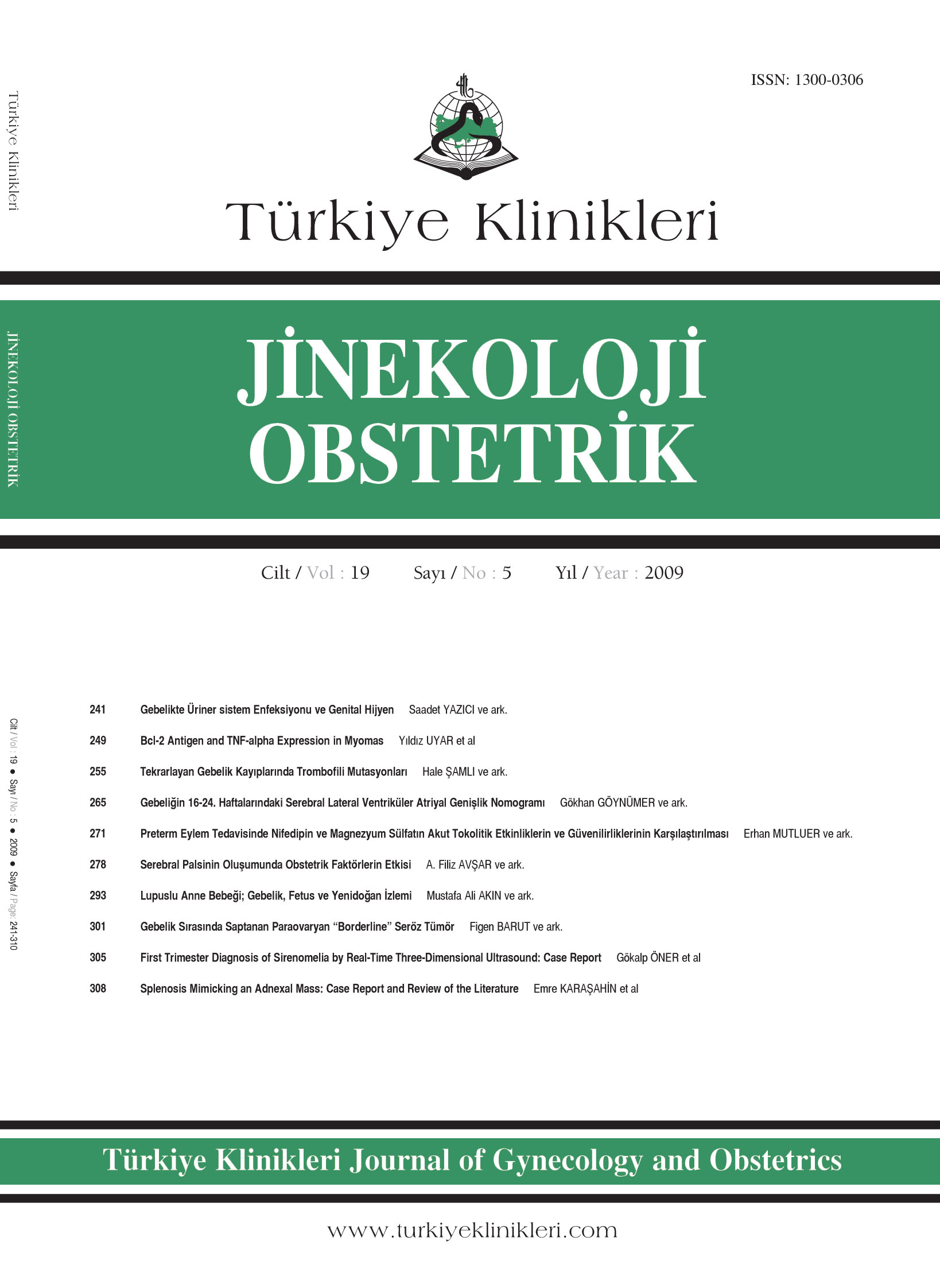Open Access
Peer Reviewed
ORIGINAL RESEARCH
3466 Viewed2951 Downloaded
Genetic Thrombophilic Defects in Women with Recurrent Fetal Loss
Tekrarlayan Gebelik Kayıplarında Trombofili Mutasyonları
Turkiye Klinikleri J Gynecol Obst. 2009;19(5):255-64
Article Language: TR
Copyright Ⓒ 2025 by Türkiye Klinikleri. This is an open access article under the CC BY-NC-ND license (http://creativecommons.org/licenses/by-nc-nd/4.0/)
ÖZET
Amaç: Koagülasyon sisteminde aksaklığa neden olan genetik kusurların tekrarlayan gebelik kayıplarındaki önemi son dönemde daha iyi anlaşılmıştır. Bunlar arasında en sık ilişkilendirilen; FV Leiden (G1691A), Protrombin (G20210A) ve MTHFR (C677T) gen mutasyonlarıdır. Biz bu çalışmada, FV Leiden, Protrombin ve MTHFR mutasyonlarının habitüel abortus (HA)'lu kadınlardaki sıklığını ve gebelik kayıplarıyla olan ilişkilerini ortaya koymayı amaçladık. Gereç ve Yöntemler: Bu çalışmada iki ve üzerinde gebelik kaybı olan 110 kadın ve hiç gebelik kaybı olmayan, sağlıklı çocuk sahibi olan 30 kadın koagülasyon sisteminin düzenlenmesinde çok önemli rolü olan, FV Leiden (G1691A), Protrombin (G20210A) ve MTHFR (C677T) mutasyon sıklığı açısından araştırılmıştır. Detaylı anamnez alınan, pedigreleri çizilen ve klinik olarak gebelik kaybını açıklayan bir neden olmayan olgulardan elde edilen DNA örneklerinde PCR-RFLP yöntemi ile mutasyon incelemesi yapılmıştır. Bulgular: FV Leiden (G1691A) mutasyonu HA grubunda %13.6, kontrol grubunda %6.7, Protrombin (G20210A) mutasyonu HA grubunda %6.4, kontrol grubunda %6.7, MTHFR (C677T) mutasyonu HA grubunda %55.5, kontrol grubun da %53.3 olguda tespit edilmiştir. Mutasyonların bulunma sıklığına bakıldığında HA ve kontrol grubu arasında istatistiksel olarak anlamlı bir fark tespit edilmemiştir. Sonuç: Gebelik kaybı riskinin, spesifik bir mutasyondan çok trombofili ile ilgili gen mutasyonlarının kombine birikimine bağlı olabileceği düşünülmüştür. HA'lı kadınlarda daha fazla trombofili ile ilgili gen mutasyonunun prevalansının araştırılması bu olguların değerlendirilmesinde daha anlamlı olacaktır.
Amaç: Koagülasyon sisteminde aksaklığa neden olan genetik kusurların tekrarlayan gebelik kayıplarındaki önemi son dönemde daha iyi anlaşılmıştır. Bunlar arasında en sık ilişkilendirilen; FV Leiden (G1691A), Protrombin (G20210A) ve MTHFR (C677T) gen mutasyonlarıdır. Biz bu çalışmada, FV Leiden, Protrombin ve MTHFR mutasyonlarının habitüel abortus (HA)'lu kadınlardaki sıklığını ve gebelik kayıplarıyla olan ilişkilerini ortaya koymayı amaçladık. Gereç ve Yöntemler: Bu çalışmada iki ve üzerinde gebelik kaybı olan 110 kadın ve hiç gebelik kaybı olmayan, sağlıklı çocuk sahibi olan 30 kadın koagülasyon sisteminin düzenlenmesinde çok önemli rolü olan, FV Leiden (G1691A), Protrombin (G20210A) ve MTHFR (C677T) mutasyon sıklığı açısından araştırılmıştır. Detaylı anamnez alınan, pedigreleri çizilen ve klinik olarak gebelik kaybını açıklayan bir neden olmayan olgulardan elde edilen DNA örneklerinde PCR-RFLP yöntemi ile mutasyon incelemesi yapılmıştır. Bulgular: FV Leiden (G1691A) mutasyonu HA grubunda %13.6, kontrol grubunda %6.7, Protrombin (G20210A) mutasyonu HA grubunda %6.4, kontrol grubunda %6.7, MTHFR (C677T) mutasyonu HA grubunda %55.5, kontrol grubun da %53.3 olguda tespit edilmiştir. Mutasyonların bulunma sıklığına bakıldığında HA ve kontrol grubu arasında istatistiksel olarak anlamlı bir fark tespit edilmemiştir. Sonuç: Gebelik kaybı riskinin, spesifik bir mutasyondan çok trombofili ile ilgili gen mutasyonlarının kombine birikimine bağlı olabileceği düşünülmüştür. HA'lı kadınlarda daha fazla trombofili ile ilgili gen mutasyonunun prevalansının araştırılması bu olguların değerlendirilmesinde daha anlamlı olacaktır.
ANAHTAR KELİMELER: Habitüel abortus; trombofili
ABSTRACT
Objective: Recently, the importance of the genetic defects causing deficiency in the coagulation system is better understood. Among these, the most frequently related ones are FV Leiden (G1691A), Protrombin (G20210A) and MTHFR (C677T) gene mutations. In the current study, we objected to investigate the frequency of the FV Leiden, Protrombin and the MTHFR mutations in women with habitual abortion (HA) and their relations with pregnancy losses. Material and Methods: In the current study, 110 women with two or more miscarriages and 30 women without miscarriage and with healthy children were investigated for the mutation frequencies of FV Leiden, Prothrombin and MTHFR that have very important roles in the regulation of the coagulation system. Mutation investigation was performed by PCR-RFLP method in DNA samples obtained from the cases with detailed anamnesis and without a reason of miscarriage that can be explained clinically. Results: FV Leiden mutation was detected to be 13.6 % in the HA and 6.7% in the control group, Prothrombin mutation was detected to be 6.4% in the HA and 6.7% in the control group, MTHFR mutation was detected to be 55.5% in the HA and 53.3% in the control group. When the mutation existence frequencies were evaluated, no statistically significant difference was detected between the HA and the control group. Conclusion: The risk of pregnancy loss was thought to be related to the combined augmentation of the thrombophilic mutations rather than a specific mutation. Investigating the prevalence of more thrombophilic mutations in women with HA will be more significant.
Objective: Recently, the importance of the genetic defects causing deficiency in the coagulation system is better understood. Among these, the most frequently related ones are FV Leiden (G1691A), Protrombin (G20210A) and MTHFR (C677T) gene mutations. In the current study, we objected to investigate the frequency of the FV Leiden, Protrombin and the MTHFR mutations in women with habitual abortion (HA) and their relations with pregnancy losses. Material and Methods: In the current study, 110 women with two or more miscarriages and 30 women without miscarriage and with healthy children were investigated for the mutation frequencies of FV Leiden, Prothrombin and MTHFR that have very important roles in the regulation of the coagulation system. Mutation investigation was performed by PCR-RFLP method in DNA samples obtained from the cases with detailed anamnesis and without a reason of miscarriage that can be explained clinically. Results: FV Leiden mutation was detected to be 13.6 % in the HA and 6.7% in the control group, Prothrombin mutation was detected to be 6.4% in the HA and 6.7% in the control group, MTHFR mutation was detected to be 55.5% in the HA and 53.3% in the control group. When the mutation existence frequencies were evaluated, no statistically significant difference was detected between the HA and the control group. Conclusion: The risk of pregnancy loss was thought to be related to the combined augmentation of the thrombophilic mutations rather than a specific mutation. Investigating the prevalence of more thrombophilic mutations in women with HA will be more significant.
MENU
POPULAR ARTICLES
MOST DOWNLOADED ARTICLES





This journal is licensed under a Creative Commons Attribution-NonCommercial-NoDerivatives 4.0 International License.










